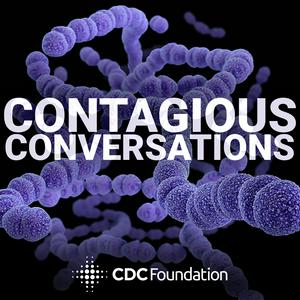48. The Costs of Getting Sick
Have you ever asked yourself what routine auto repairs can teach us about how we think of our investment in public health? Listen in on our latest Contagious Conversations podcast as host Claire Stinson uncovers the answers and details how quick action quashed a recent outbreak of an illness long considered to be eliminated in the United States. In this episode, “The Costs of Getting Sick,” we explore the overlap between public health and the health of our economy with guests Dr. Dan Filardo of CDC, Dr. Michael Osterholm of the Center for Infectious Disease Research and Policy and Dr. Alexander Sloboda of the Chicago Department of Public Health. Join us! Episode Quotes “Obviously, the rash, the fever, cough, red, itchy eyes, runny nose are the symptoms commonly you get with measles, but it can also be very dangerous, and it can be deadly sometimes.” — Dr. Alexander Sloboda, Medical Director of Immunization and Emergency Preparedness Programs, Chicago Department of Public Health “Because this case was in a large congregate setting, we were really in communication with Chicago right off the bat, anticipating that there might be an outbreak.” — Dr. Dan Filardo, a medical officer with CDC’s measles team “You have outbreaks in schools with these vaccine-preventable diseases, you interrupt education substantially. Now, what's the cost of that? What does that mean? What happens when kids fall behind? What happens when the teachers can't teach? And, unfortunately, we don't have a lot of these things qualified or quantified in terms of what they really mean, economically.” — Dr. Michael Osterholm, author and director of the Center for Infectious Disease Research and Policy Thanks to Our Guests Dr. Dan Filardo, a medical officer with the measles team at CDC Dr. Alexander Sloboda of the Chicago Department of Public Health Dr. Michael Osterholm, author and director of the Center for Infectious Disease Research and Policy For more information and full episode transcripts, go to Contagious Conversations.
